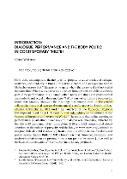Introduction: Dialogue, Performance and the Body Politic in Contemporary Theatre

Publication date
2022Published in
Litteraria Pragensia: Studies in Literature and CultureVolume / Issue
32 (63)ISBN / ISSN
ISSN: 0862-8424Metadata
Show full item recordCollections
This publication has a published version with DOI 10.14712/2571452X.2022.63.1
Abstract
How does contemporary theatre practice propose creative modes of critique, resilience, and solidarity in times of precarity, violence, and antagonism? Florian Malzacher argues that “Theatre is the space where things are real and not real at the same time. Where we can observe ourselves from the outside whilst also being part of the performance. It is a paradox that creates situations and practices that are symbolic and actual at the same time.” What can we learn from a focus on the forms that paradox takes and the meanings that emerge from it? The articles collected in this special issue are the outcome of a conference at the Faculty of Arts, Charles University in 2021 under the auspices of the European Regional Development Fund Project “Creativity and Adaptability as Conditions of the Success of Europe in an Interrelated World.” The focus of that online meeting on performance, polarisation, dissensus and dialogue was, inevitably, inflected by the Covid-19 pandemic which throughout 2020 and 2021 concentrated global attention on the politics of precarity and the body in ways previously difficult to imagine. Indeed, amid increasingly heated disputes over personal freedoms and public spaces, Judith Butler’s 2012 observation that “unwilled proximity and unchosen cohabitation are preconditions of our political existence […] as well as the basis of our obligations […],” seems even more keenly pertinent. This introductory essay uses Chantal Mouffe’s term “agonistic pluralism” alongside Jacques Rancière’s concept of dissensus to explain what the contributions to the special issue illuminate about dialogue and performance.
Keywords
contemporary theatre, dialogue, performance, critique, resilience, precarity, the body
Permanent link
https://hdl.handle.net/20.500.14178/2535License
Full text of this result is licensed under: Creative Commons Uveďte původ-Neužívejte dílo komerčně-Nezpracovávejte 2.0 Generic




